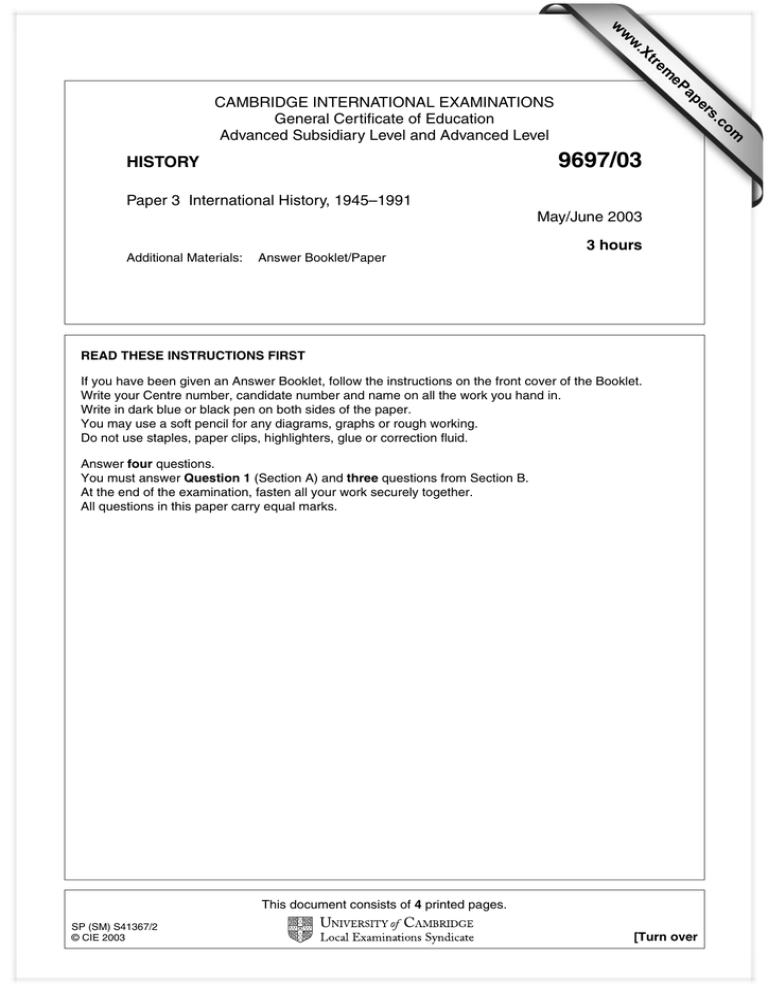CAMBRIDGE INTERNATIONAL EXAMINATIONS General Certificate of Education www.XtremePapers.com
advertisement

w w ap eP m e tr .X w om .c s er CAMBRIDGE INTERNATIONAL EXAMINATIONS General Certificate of Education Advanced Subsidiary Level and Advanced Level 9697/03 HISTORY Paper 3 International History, 1945–1991 May/June 2003 3 hours Additional Materials: Answer Booklet/Paper READ THESE INSTRUCTIONS FIRST If you have been given an Answer Booklet, follow the instructions on the front cover of the Booklet. Write your Centre number, candidate number and name on all the work you hand in. Write in dark blue or black pen on both sides of the paper. You may use a soft pencil for any diagrams, graphs or rough working. Do not use staples, paper clips, highlighters, glue or correction fluid. Answer four questions. You must answer Question 1 (Section A) and three questions from Section B. At the end of the examination, fasten all your work securely together. All questions in this paper carry equal marks. This document consists of 4 printed pages. SP (SM) S41367/2 © CIE 2003 [Turn over 2 Section A You must answer Question 1. THE INTERNATIONAL COMMUNITY’S RESPONSE TO INTERNATIONAL TERRORISM 1 Read the sources and then answer the question. Source A Mr Abdallah (Tunisia) said that international terrorism had made its appearance in Palestine, when aliens had spread terror among the peaceful and hard-working people who had to contend with the misdeeds of the Zionist terrorist organisation, whose horrible acts were still vividly remembered by all. At that time the United Nations had given those terrorists a state – a large portion of Palestine – which had become what could be called a ‘terrorist state’. Subsequently the Palestinians had organised themselves and were resisting the enemy with similar terrorist methods. For the peoples subjected to the same state terrorism, the liberation struggle had become a sacred duty. Having been elevated to a state doctrine, it was hardly surprising that terrorism should spread and assume international proportions. Even the United Nations building in New York had been threatened. This shows the urgent need to find solutions, the first of which should be a thorough investigation of the problem in order to eliminate the cause of the evil. The United Nations Ad Hoc Committee on International Terrorism, 1977. Source B The issue of international terrorism has been discussed on and off in the public forum since the 1960s. However, the response of the United Nations to international terrorism has been far from spectacular. The political polarisation of the world makes it very unlikely that the United Nations will deliver a co-ordinated and effective policy on the subject. In Soviet perceptions, ‘terrorism’ is only possible in capitalist societies. The Soviet Union has consistently applied the word ‘terrorist’ to Western state behaviour and frequently to attacks taking place on Western soil against Western targets. The Soviet Union has at no time condemned terrorist activities as a tactic in the larger geopolitical conflict, as long as that conflict could be regarded as ‘revolutionary’ and therefore perpetrated by ‘freedom fighters’. Roberta Goren, a British author, writing in her book ‘The Soviet Union and Terrorism’, 1984. Source C The first thing to understand is that collective action does matter. In fact, it makes all the difference. When there was a wave of airplane hijackings in the early 1970s, it was argued by some that nothing could be done. But once appropriate security measures were adopted by the democracies, they did, in fact, work. In 1979 the Western powers issued the Bonn Declaration, making it clear that severe penalties would be suffered by countries that welcomed hijackers. As a result, the number of plane hijackings from Western airports was reduced significantly. Paul Laxalt, US senator, speaking in 1984. 9697/03/M/J/03 3 Source D At the global level, the response to international terrorism has been weak. There have been many obstacles to effective international co-operation, whether through United Nations’ resolutions or through other general measures. The East-West ideological conflict has resulted in mutual accusation by the superpowers. Many states have resisted any international move which would either reduce their scope for using international terrorism as a weapon or thwart what they see as legitimate armed struggles. It is likely to be some time before the international community translates the rhetoric of recent UN resolutions against terrorism into effective enforcement measures. So far the only worthwhile international legal achievements in this field have been the conventions on air piracy and the protection of diplomats. Paul Wilkinson, British expert on international terrorism, 1986. Source E While all governments uniformly offer rhetorical opposition to terrorism, including the adoption of a UN resolution condemning terrorism in 1985, in practice they fall into one of three categories. A few governments actually oppose terrorism and do so consistently. Others actively support terrorists. Most fall into a third category, the neutrals. They either ignore terrorism or refuse outright to oppose it. Governments must be made to understand that if they ignore terrorism they are in practice supporting it. Benjamin Netanyahu, Israeli politician, writing in his book ‘Terrorism : How the West can Win’, 1986. Now answer the following question. How far do Sources A–E support the view that ‘international efforts to curb the growth of international terrorism in the period 1945–1991 were worthless’? 9697/03/M/J/03 [Turn over 4 Section B You must answer three questions from this section. You must not answer both Question 3 and Question 4. 2 How far do you agree that the Cold War broke out in Europe because the USA and the USSR disagreed fundamentally about how they should treat the shattered European economy? 3 Why did the Cold War spread to the Third World in the 1960s and 1970s? OR 4 How far do you agree that none of the great powers involved in the Korean War had expansionist ambitions? 5 How far was the collapse of communism in Eastern Europe in 1989 responsible for the collapse of the USSR in 1991? 6 Analyse the reasons why the nuclear arms race between the superpowers ended in the 1980s. 7 ‘The development of the international economy in the period 1945–1991 favoured rich countries at the expense of the poor.’ How far do you agree? 8 Account for the rise of Islamic fundamentalism in the Cold War era. 9697/03/M/J/03




